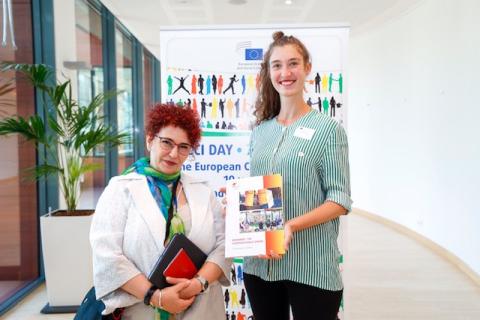European Economic
and Social Committee
ECI: on 10th anniversary EESC seeks to boost its impact
On European Citizens' Initiative (ECI) Day 2022, hosted by the EESC on 2 June, speakers and activists stressed that a more impactful ECI would also be more popular.
The EESC celebrated a decade of ECIs with an event taking stock of achievements and challenges and looking forward to the future. Speakers and activists painted a mixed picture, with some remarkable successes standing side by side with shortcomings and weaknesses, among which impact, accessibility and visibility stood out.
"We are celebrating the 10th anniversary of this still unique transnational participatory tool," said EESC president Christa Schweng as she opened the event. "Ten years is a long time: we have definitely gained some experience. But it is also very short: we still have to learn, improve and make sure the ECI gets the place it deserves in the EU institutional process."
The EESC president announced the EESC's decision to take a stance on relevant successful initiatives before the European Commission actually responds to them, starting with Save the Bees. It will also pay special attention to young people and monitor how Member States are taking up the possibility of lowering to 16 the minimum age for signing an ECI – an option that has so far become a reality in one Member State, in addition to three others where the voting age in general is 16 or 17.
Commission Vice-President Dubravka Šuica said: "The ECI is an example of the institutions' ability to adapt, change and improve our engagement with citizens. Our focus must be on continuing to develop an ecosystem of democratic innovation and citizen engagement and participation in democracy."
MEP Helmut Scholz suggested that, if the European Parliament were to acquire the right of legislative initiative through treaty changes following the Conference on the Future of Europe, it could take it upon itself to make sure that successful ECIs are followed through.
One workshop zoomed in on the success of recent ECIs. Their initiators agreed that, in the absence of substantial financial resources for campaigns, whose cost they estimated at some EUR 300,000, the backing of NGOs was key to obtaining the required one million signatures. People trust them, they stressed, and because they trust them, they are more willing to sign and provide the personal information required by Member States.
Another session looked at the popularity of the ECI among young people, who rank high among initiators, though not among the most successful ones. Speakers discussed how the institutions could encourage more young people to use tools like the ECI. Young activists stressed that political education at a young age is necessary across the EU to prevent such tools from being accessible only to the highly-educated few. Learn more about the event. (dm/rl)
